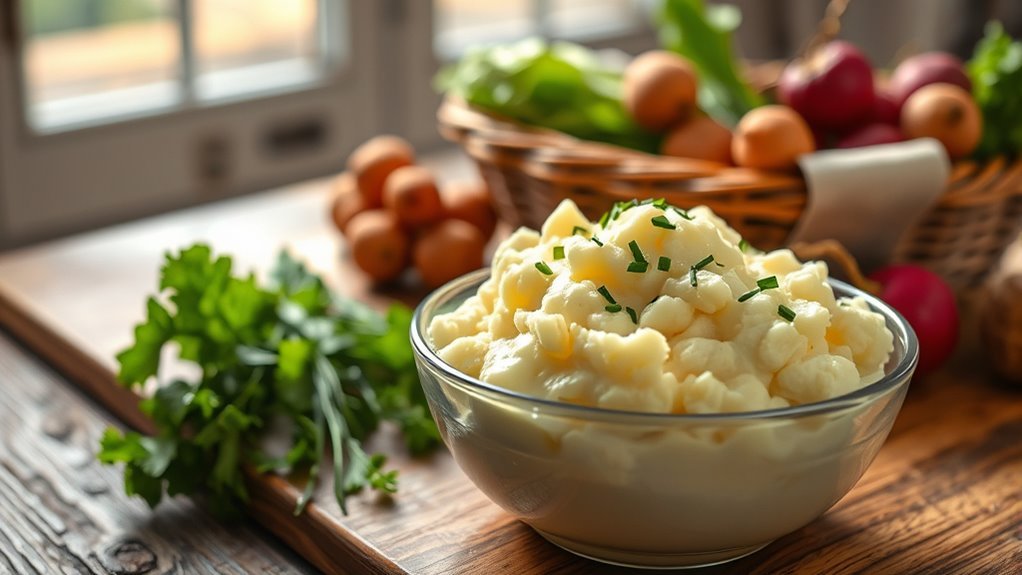Potatoes aren’t typically recommended on a keto diet due to their high carbohydrate content. A medium potato can contain over 30 grams of carbs, which can push you over your daily limit and hinder ketosis. While they offer some nutrients, the high glycemic index can lead to cravings for more carbs. If you’re keen on enjoying potatoes, serving sizes should be small, and it’s important to pair them with low-carb options. There are plenty of alternatives worth exploring.
Understanding the Keto Diet and Its Carb Restrictions

When you commence a keto diet, it’s essential to understand its fundamental principle: drastically reducing carbohydrate intake while increasing fat consumption. The keto principles focus on pushing your body into ketosis, a metabolic state where fat becomes your primary energy source. To achieve this, you’ll need to engage in carb counting, typically limiting your daily intake to around 20-50 grams of net carbs. This restriction helps your body adapt to burning fat instead of glucose. While it can feel restrictive, embracing these guidelines offers you the freedom to explore various high-fat, low-carb foods. Understanding the balance between fats and carbs is vital for long-term success on the keto journey, empowering you to make informed choices that align with your health goals.
Nutritional Breakdown of Potatoes

When looking at the nutritional breakdown of potatoes, you’ll notice their significant carbohydrate content, which can impact your keto diet. It’s important to evaluate both the carb levels and the overall nutrient composition, as potatoes also provide vitamins and minerals. Understanding these aspects can help you make informed choices about including potatoes in your meal plan.
Carbohydrate Content Analysis
Although potatoes are a staple in many diets, their carbohydrate content can pose a challenge for those following a ketogenic lifestyle. Different potato varieties have varying carb counts, making it essential to understand these differences for carb comparisons. Here’s a quick look at the carbohydrate content in popular potato types:
| Potato Variety | Carbohydrates (g) per 100g |
|---|---|
| Russet | 17 |
| Red | 15 |
| Yukon Gold | 17 |
| Sweet Potato | 20 |
As you can see, even small servings of these potatoes can quickly add up in carbs. If you’re aiming for ketosis, moderation is key when it comes to these starchy veggies. Consider alternatives that align more closely with your dietary goals.
Nutrient Composition Overview
While potatoes are often seen as a comfort food, their nutritional profile reveals both benefits and drawbacks, especially for those on a keto diet. Different potato varieties, like russets and reds, offer varying amounts of carbohydrates, typically around 30 grams per medium potato. Beyond carbs, potatoes provide essential nutrients like vitamin C, potassium, and fiber, which can be beneficial. However, these nutritional benefits come at the cost of higher carb content, making it challenging to fit into a strict keto lifestyle. If you choose to indulge, consider portion control and pairing potatoes with low-carb foods to maintain your desired macro balance. Ultimately, enjoying potatoes on keto requires thoughtful planning and moderation.
The Impact of Potatoes on Ketosis

If you’re following a ketogenic diet, understanding the impact of potatoes on ketosis is essential. Potatoes are high in carbohydrates, which can greatly hinder your ability to maintain ketosis. A single medium potato can contain over 30 grams of carbs, easily surpassing your daily limit on keto. This doesn’t mean you’re out of options—there are plenty of potato alternatives and keto-friendly vegetables that can help satisfy cravings without derailing your diet. Cauliflower, zucchini, and turnips are excellent substitutes that provide similar textures and flavors while being low in carbohydrates. Choosing these alternatives can help you stay in ketosis, giving you the freedom to enjoy delicious meals without compromising your dietary goals.
Creative Ways to Enjoy Potatoes on a Keto Diet
If you’re looking to enjoy potatoes while sticking to a keto diet, there are some creative alternatives that can satisfy your cravings. Cauliflower potato mash, zucchini potato fritters, and radish potato salad are all delicious options that keep your carb intake in check. These dishes not only provide flavor but also incorporate lower-carb ingredients, making them a smart choice for your meals.
Cauliflower Potato Mash
Cauliflower potato mash offers a delicious and low-carb alternative to traditional mashed potatoes, making it a perfect fit for your keto diet. With its creamy texture, cauliflower not only satisfies your cravings but also packs a nutritional punch. Here are three reasons to give it a try:
- Low-Carb Content: Cauliflower has markedly fewer carbs than potatoes, helping you stay within your keto limits.
- Rich in Nutrients: Cauliflower nutrition includes vitamins C, K, and B6, providing essential nutrients without the extra carbs.
- Versatile Flavor: You can easily customize your mash with garlic, herbs, or cheese, making it an exciting addition to your meals.
Zucchini Potato Fritters
While traditional potato fritters are off-limits on a keto diet, zucchini offers a fantastic substitute that keeps your meals both tasty and compliant. Zucchini fritters are not only keto-friendly but also easy to whip up, making them a great addition to your recipe arsenal. They’re low in carbs and high in fiber, allowing you to indulge without the guilt.
Here’s a quick comparison to inspire your cooking:
| Ingredient | Traditional Fritters | Zucchini Fritters |
|---|---|---|
| Carbs per serving | 30g | 5g |
| Fiber per serving | 2g | 1g |
| Cooking time | 20 minutes | 15 minutes |
Try these zucchini fritters today—your taste buds and waistline will thank you!
Radish Potato Salad
Zucchini fritters are a fantastic way to enjoy low-carb meals, but there are even more creative substitutes for traditional potato dishes. One great option is a radish potato salad, which offers unique radish benefits like improved digestion and reduced inflammation. Plus, radishes have a satisfying crunch that adds texture to your meal.
Here are three delicious salad variations you can try:
- Classic Radish Salad: Combine sliced radishes, cucumbers, and a lemon vinaigrette for a revitalizing dish.
- Creamy Radish Salad: Mix radishes with avocado, Greek yogurt, and herbs for a rich, satisfying flavor.
- Spicy Radish Salad: Toss radishes with jalapeños, lime juice, and cilantro for a zesty kick.
Enjoy these guilt-free alternatives while sticking to your keto lifestyle!
Low-Carb Alternatives to Potatoes
If you’re looking to maintain a low-carb lifestyle without giving up the comforting texture and satisfaction of potatoes, there are several alternatives that can fit seamlessly into your meals. One great option is turnip fries, which can be sliced, seasoned, and baked for a crispy, satisfying side. They’re low in carbs and rich in nutrients, making them an excellent substitute. Another option is using sweet potato alternatives, like cauliflower or even zucchini, which can be mashed or roasted to mimic traditional potato dishes. These alternatives not only help you stay on track with your carb goals but also allow you to enjoy familiar flavors and textures. With these choices, you can experience the freedom of variety without compromising your lifestyle.
Tips for Incorporating Potatoes Mindfully in Your Meal Plan
Although potatoes can be higher in carbohydrates, you can still incorporate them into your meal plan mindfully. Here are some tips to help you enjoy potatoes without derailing your goals:
- Mindful Portions: Keep your serving sizes small. Aim for a balance that fits your daily carb allowance.
- Choose Cooking Methods Wisely: Opt for steaming, baking, or roasting instead of frying. These methods retain nutrients and reduce added fats.
- Meal Prep: Plan your meals ahead of time. Prepare potato-based dishes alongside low-carb options to create balanced, satisfying meals.
Can you eat potatoes on a keto diet?
Typically, potatoes are not considered keto-friendly due to their high carbohydrate content. A standard serving of potatoes can contain around 30 grams of carbs, which can exceed the daily carb limit on a typical ketogenic diet. The goal of keto is to enter a state of ketosis, where the body burns fat for fuel instead of carbohydrates, and consuming potatoes can hinder this process.
What are low-carb alternatives to potatoes on keto?
There are several low-carb alternatives to potatoes that can fit well within a keto diet. Some popular options include:
- Cauliflower: Mashed cauliflower can mimic the texture of mashed potatoes and is low in carbs.
- Turnips: These can be roasted or mashed, providing a similar taste and texture with fewer carbs.
- Radishes: When cooked, radishes can be a surprisingly good substitute for potatoes in various dishes.
- Shirataki noodles: These can be used in place of potato noodles or as a base for sauces.
What happens if you eat potatoes while on a keto diet?
If you consume potatoes while on a keto diet, it can lead to an increase in your daily carbohydrate intake, potentially kicking you out of ketosis. This can result in your body reverting to burning glucose for energy instead of fat. Depending on your individual carb tolerance, this could affect your weight loss progress and energy levels.
Are there any exceptions for eating potatoes on keto?
While it is generally advised to avoid potatoes on a strict keto diet, some people may choose to incorporate small amounts of potatoes occasionally, especially if they are not in strict ketosis or are in a maintenance phase. Additionally, some low-carb diets may allow for small servings of sweet potatoes or other varieties, as they have a lower glycemic index than regular potatoes. However, moderation is key, and it’s essential to monitor your body’s response.
Can you consume potato skins on a keto diet?
Potato skins are still part of the potato, which means they carry the same high carbohydrate content. Therefore, consuming potato skins is not advisable on a strict keto diet. Even though the skin contains some fiber and nutrients, the carb content is too high for most keto dieters. It’s better to stick with low-carb alternatives that provide similar textures and flavors without the high carb count.
References
- https://www.healthline.com/nutrition/keto-diet-foods#foods-to-avoid
- https://www.ncbi.nlm.nih.gov/pmc/articles/PMC6520702/
- https://www.webmd.com/diet/what-is-the-ketogenic-diet
- https://www.mayoclinic.org/healthy-lifestyle/nutrition-and-healthy-eating/expert-answers/keto-diet/faq-20460206
- https://www.cdc.gov/healthyweight/healthy_eating/vegetables.html
- https://www.nutrition.gov/topics/nutrition-101/what-ketogenic-diet
- https://www.verywellfit.com/what-is-the-keto-diet-5114956
- https://en.wikipedia.org/wiki/Ketogenic_diet


